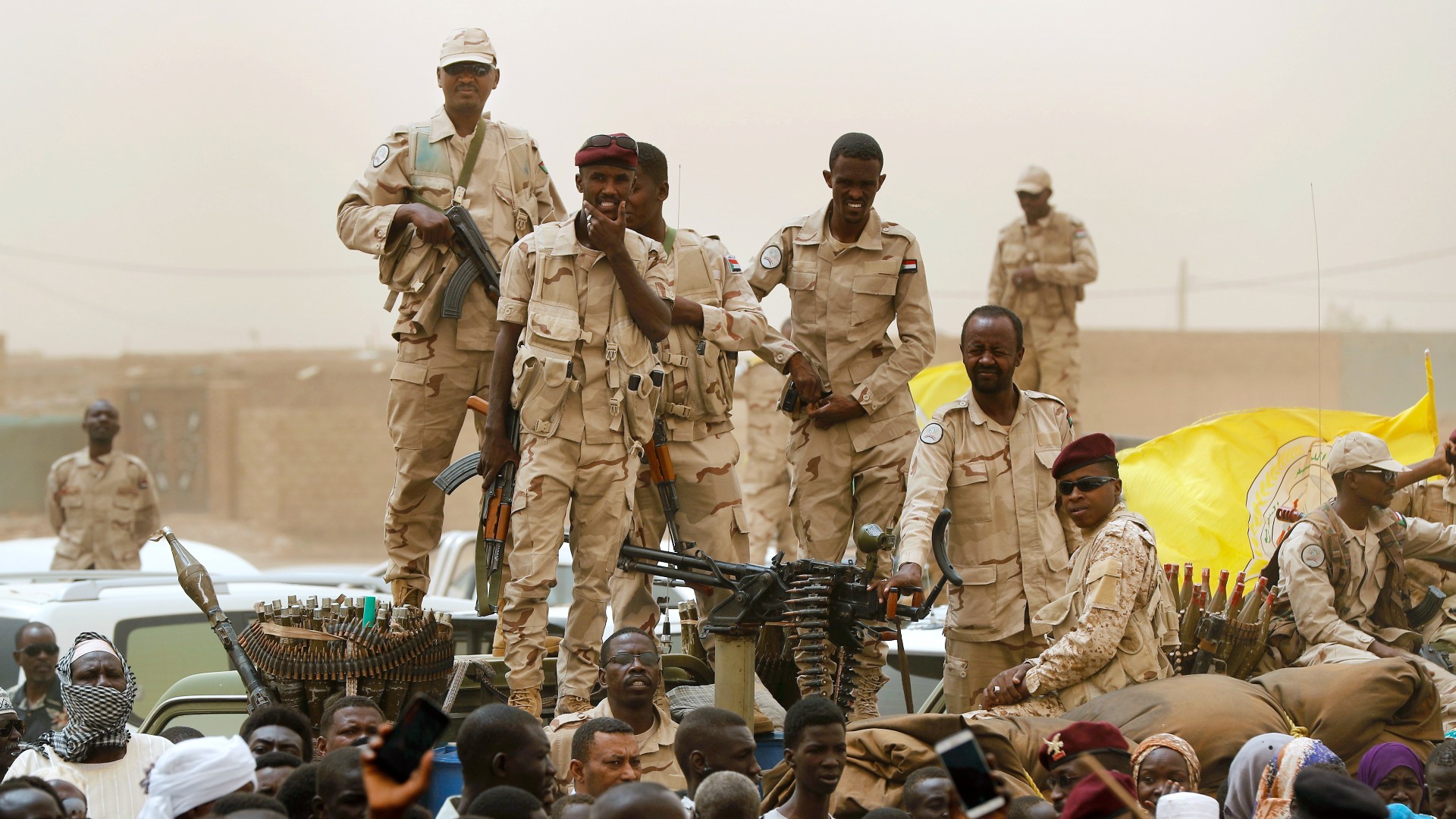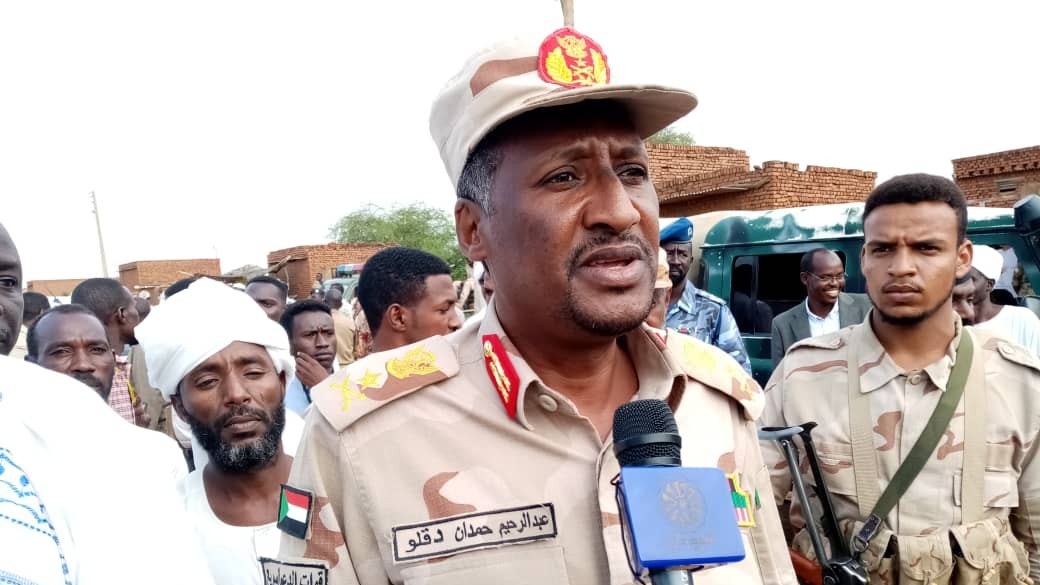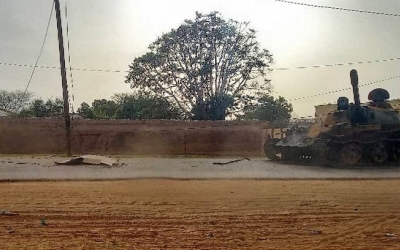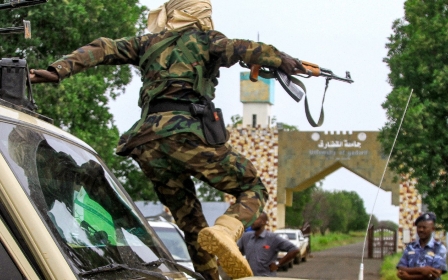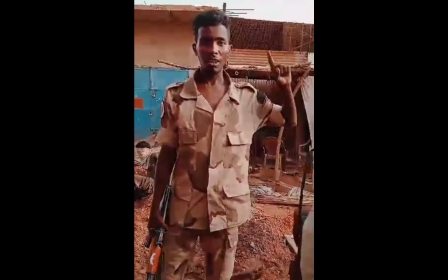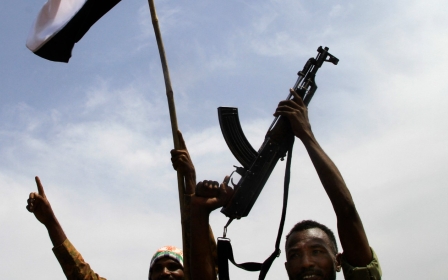Sudan: Almost all of Darfur falls to the RSF in severe blow to the army
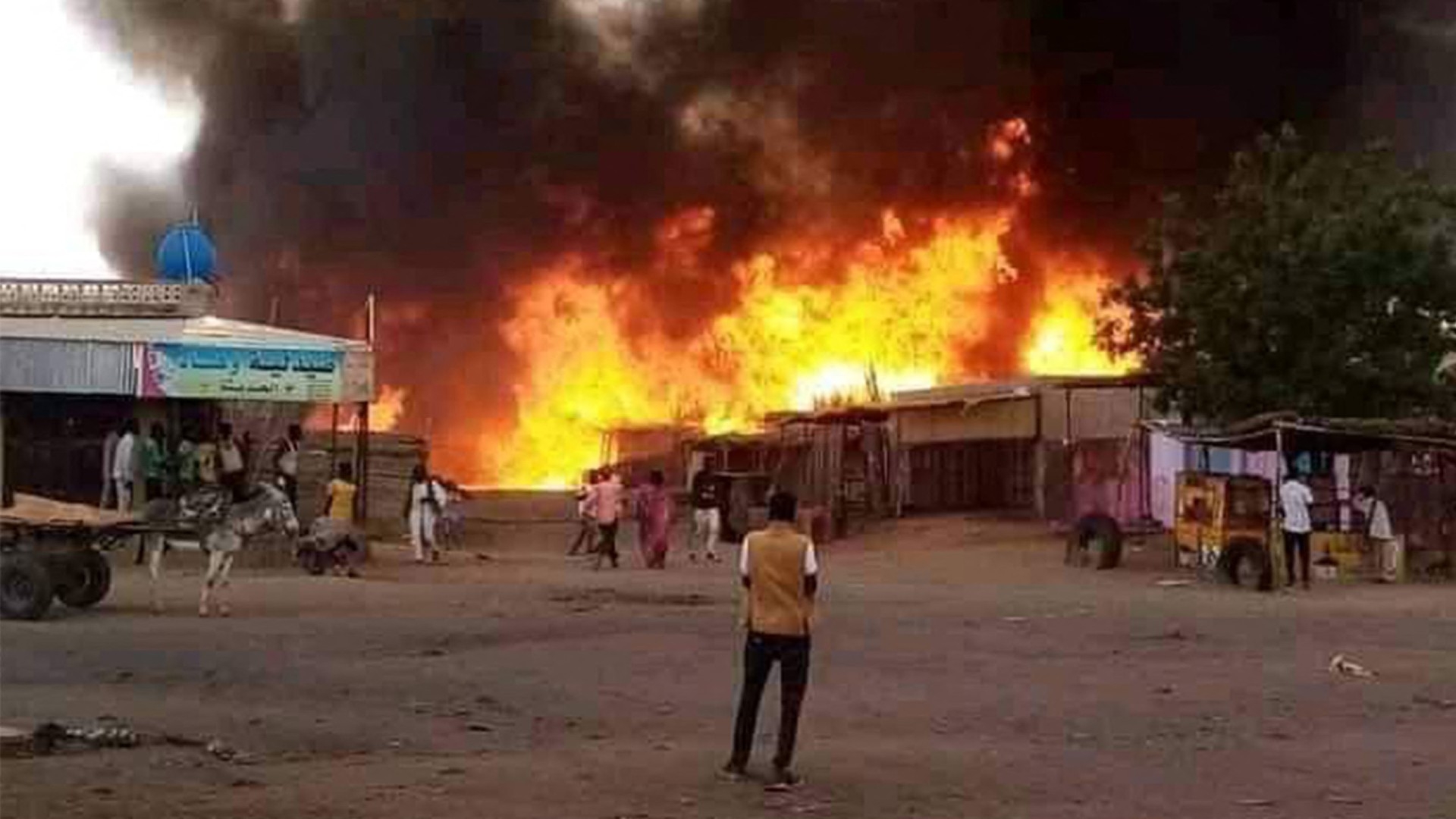
Sudan’s paramilitary Rapid Support Forces (RSF) has seized the majority of the western Darfur region in a shock collapse of the Sudanese army that has huge implications for the six-month-old war.
The development comes as talks between the warring parties in Jeddah, held under the auspices of the United States and Saudi Arabia, failed to achieve any breakthroughs.
Leading the charge in Darfur is Abdul Rahim Hamdan Dagalo, brother of the RSF leader Mohammed Hamdan Dagalo, a man better known as Hemeti.
Under Abdul Rahim Hamdan Dagalo, the RSF in recent weeks has secured control of four of Darfur’s five states.
Only North Darfur and its state capital al-Fasher remain in the hands of the Sudanese Armed Forces (SAF). Yet there are signs that SAF presence there, too, is at risk.
New MEE newsletter: Jerusalem Dispatch
Sign up to get the latest insights and analysis on Israel-Palestine, alongside Turkey Unpacked and other MEE newsletters
The paramilitary force also appears to be cementing its presence in the region by establishing its own local administrative authorities, another step towards the Sudanese state’s fragmentation as SAF leaders work to form a “war government” in Port Sudan on the eastern coast.
Asserting control
Soon after talks in Jeddah opened on 29 October, the RSF symbolically began publishing footage of its forces in full control of Nyala and Zalingi, the state capitals of south and central Darfur, respectively.
There have been clashes in Nyala from the beginning of the conflict, but in August the RSF began a new push to take the city with disastrous results.
Witnesses previously told Middle East Eye of mass killings, sexual violence, looting of homes and attacks on health facilities, as well as other services.
Sudanese who recently fled Nyala, the country’s second-largest city after Khartoum, told MEE the RSF now has full control and has set up its own administration there.
'The RSF want to show by any means that it is business as usual in the city, so they are spending a huge amount of money'
- Ahmed Adam, Nyala resident
Ahmed Adam escaped Nyala in late October and is now in Kosti city in central Sudan’s White Nile state.
He said that the RSF has ordered police officers to return to Nyala’s streets and told its troops to not attack civilians in a bid to project a sense of security and stability. The RSF also has supported local figures close to the paramilitary force to act as administrators and deliver services.
“The RSF wants to show by any means that it is business as usual in the city, so they are spending a huge amount of money to convince policemen to return to their duties, as well as paying for local leaders, NGOs and many local initiatives to reopen the hospitals and schools and return water and electricity services,” he said.
“We have also seen the RSF doing patrols with the police in the market, trying to prompt shops to reopen after a long period of them being closed and looted. They are also cracking down on drug dealers and trying to return internet services.”
Some Nyala residents who fled to nearby villages have begun to return, Adam said, to inspect their homes and properties for damage.
Echoes of a previous war
Soon after the Sudanese war broke out in mid-April, when tensions over plans to fold the RSF into the regular military became violent, Darfur became a key battleground.
The backbone of the RSF’s estimated 100,000 fighters is drawn from Arab tribesmen from the region.
Many of its fighters, including the Dagalo brothers, once belonged to the fearsome Janjaweed militias that former president Omar al-Bashir used to wage a genocidal war against Black African tribes and rebels in Darfur between 2003 and 2005, a conflict that killed 300,000 people.
Sharing borders with Libya, Chad, South Sudan and the Central African Republic, Darfur quickly became an important place for the RSF to maintain its supply lines as the bulk of fighting was centred in the capital Khartoum.
The Sudanese military’s success in holding Nyala in the war’s earliest days came as a shock, as it is the stronghold of Arab tribes allied with Hemeti, particularly the Rizeigat.
When hostilities escalated in August, the RSF and allied Arab militias reportedly began attacking civilians from Black African tribes like the Doju, in scenes reminiscent of West Darfur’s el-Geneina, where horrific abuses recently prompted an International Criminal Court investigation.
Adam Haroun, a Nyala resident, told MEE that the RSF has targeted Black African civilians in revenge attacks since taking full control of the city as well.
“The situation in Nyala city after the seizure of the city by the RSF and its Arab militias is relatively calm. But there are incidents of revenge attacks,” he said.
“Even if people don’t like the RSF they have no choice but to accept the situation as it is.”
Similarly in Zalingi, a source, who remains anonymous for security reasons, said RSF fighters killed civilians, abused women and drove people from their homes after taking the city on 31 October.
Around Darfur are various camps home to around 2.5 million Sudanese displaced in the 2003-05 conflict. Hosting Black African Sudanese, they are undefended and particularly vulnerable to attacks.
Bakhit Mubarak, a resident of al-Hamaida camp in Central Darfur, said Arab militias allied with the RSF have repeatedly attacked the camp since the war broke out, killing around 10 people so far.
Appearance of new leader
Despite being sanctioned by Washington in September, Abdul Raheem Hamdan Dagalo has been front and centre of the RSF offensive in Darfur.
He has been seen addressing his victorious forces in front of the army headquarters in both Nyala and Zalingi.
In footage from Nyala published by the RSF, he is seen vowing to track down people he referred to as “associates of the deep state” and “Islamists”, calling on the people of Nyala to return. Around 50,000 people were estimated to have fled Nyala in August, alongside another 17,000 earlier this month.
A few days after the footage from Nyala was released, more videos were published from Zalingi, where Dagalo was seen promising to control the entire region and expel the Sudanese military, which he linked with Bashir’s former government. Bashir was ousted by the military and Hemeti in 2019 following a popular pro-democracy revolution.
Dagalo has taken up where Hemeti left off. After the outbreak of war, Hemeti was seen in many videos amongst his men. Then he disappeared, reportedly hit by an air strike, with sources previously telling MEE that he had been treated in a hospital in Khartoum after being wounded.
Though Hemeti has reappeared, his public appearances are few, and his brother has become increasingly prominent in turn - particularly in Darfur.
Expansion and siege
The RSF has been scoring victories in various parts of Sudan.
Since the head of the Sudanese Armed Forces, General Abdel Fattah al-Burhan, escaped Khartoum in August after months of being besieged within the army headquarters, the RSF has used its street-fighting skills to take more of the city.
Sources in al-Fasher and al-Obeid, the capital of North Kordofan state, say the cities are currently under siege, surrounded by the RSF on all sides.
The RSF also captured the Balila oil field in West Kordofan on 30 October after hours of heavy clashes pushed the Sudanese army out.
The US State Department warned on Thursday that al-Fasher looked like the RSF’s next target, saying it was “deeply troubled” by the prospect “that would subject civilians, including hundreds of thousands of displaced persons - many of whom only recently fled to al-Fasher from other areas - to extreme danger”.
Similarly, the United Nations Integrated Transition Assistance Mission in Sudan (Unitams) also warned of the danger an attack on al-Fasher would pose to civilians, “in a context of heightened intercommunal tensions, recalling the events in el-Geneina in Darfur last June”.
A source in the Sudanese military described its exit from Nyala and Zalingi as a “tactical withdrawal”, but said the SAF would “never abandon its responsibilities of combating the militias and protecting civilians”.
Media reports suggested that Major General Hussein Jawdat, who was overseeing SAF forces in Nyala, had been wounded during the battles and was currently recovering in a hospital.
Following the losses, Burhan addressed his forces at Wadi Sayyidna air force base in Omdurman, Khartoum’s sister city lying on the west bank of the Nile. He promised to win back Nyala and Zalingi.
“We went for the talks in Jeddah, but that doesn’t mean we will abandon our principles in crushing the militias. Don’t listen to the voices saying that we will accept this situation,” he said.
The setbacks come as the Burhan-led Sovereign Council, an executive body set up in the transitional political process that followed Bashir’s ousting, replaced four ministers and cemented the SAF’s control.
It also removed one of its members, former Darfur rebel leader al-Hadi Idris, on Thursday. In response, Idris accused Burhan of being the “igniter of war” and suggested the decision was made because he refused to relocate to Port Sudan.
A conflict of interests
Sudanese analyst Mohamed Badawi believes the latest developments indicate the RSF intends to declare a temporary Sudanese government in Darfur, parallel to Burhan’s “war government”, and its focus on administration in the recently taken areas is a step towards this.
He told MEE that the RSF is also aiming to secure its supply routes to the Central African Republic, where it gets assistance from Russia’s Wagner Group, and Chad, where it receives supplies through the city of Amdjarass.
'The scenario of dividing the country is possible'
- Mohamed Badawi, analyst
He noted that remaining SAF presence in Darfur is strictly restricted to army bases, indicating the military’s supply lines have been cut.
Badawi, who is a senior researcher at the African Centre for Justice and Peace Studies (ACJPS), described the war as a conflict of interests - not just between local rivals but the rivals’ regional and international allies too.
According to Badawi, the split between former Darfur rebel groups, who became part of the state apparatus in the 2020 Juba peace agreement, led to the failure of local security forces in protecting civilians from harm after war broke out.
“The scenario of dividing the country is possible,” he warned.
“The RSF, as a paramilitary, received wide privileges and resources during Bashir’s period and during the transitional period, and currently have wide ambitions to reshape the entire country in the post-war period.”
Middle East Eye delivers independent and unrivalled coverage and analysis of the Middle East, North Africa and beyond. To learn more about republishing this content and the associated fees, please fill out this form. More about MEE can be found here.


